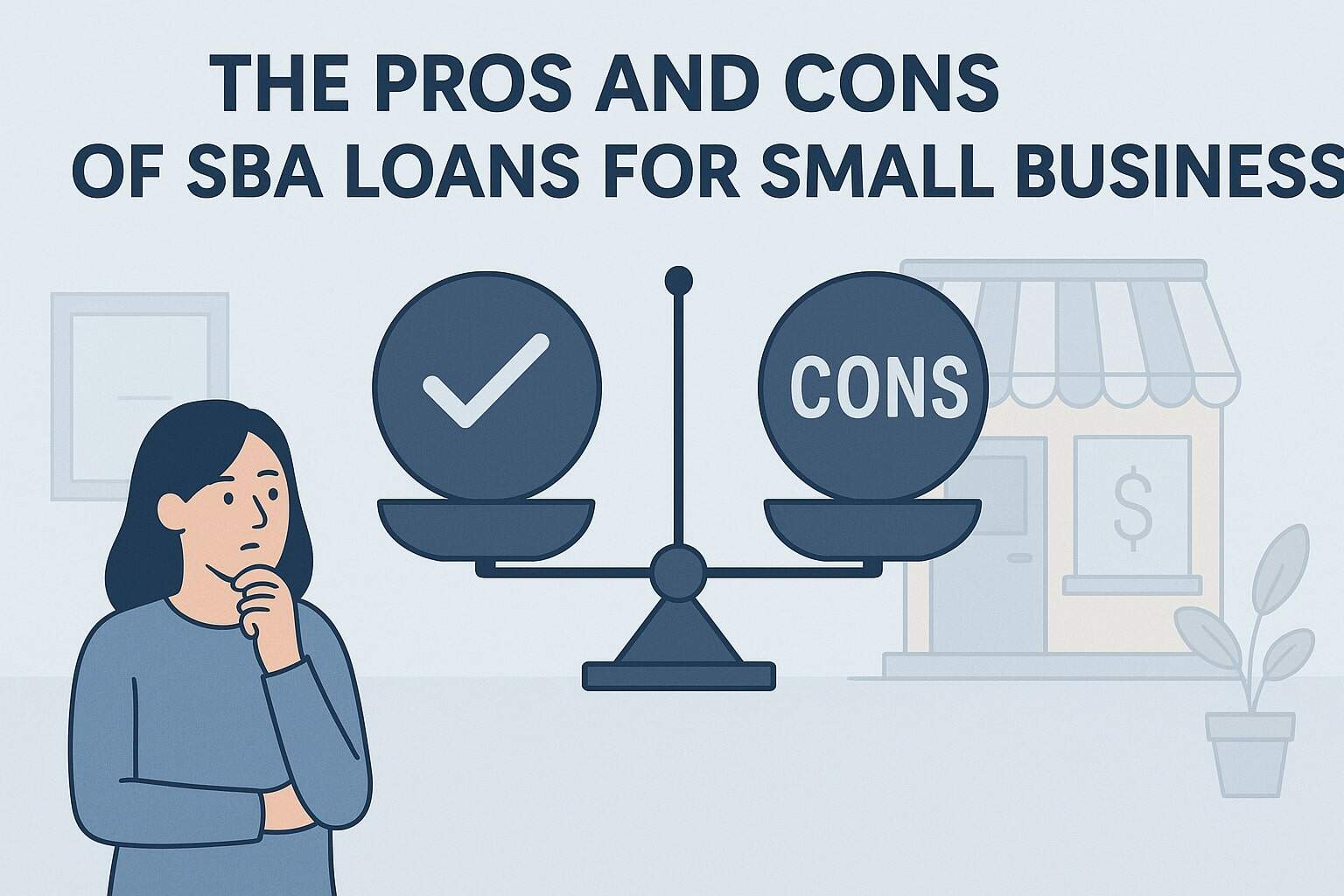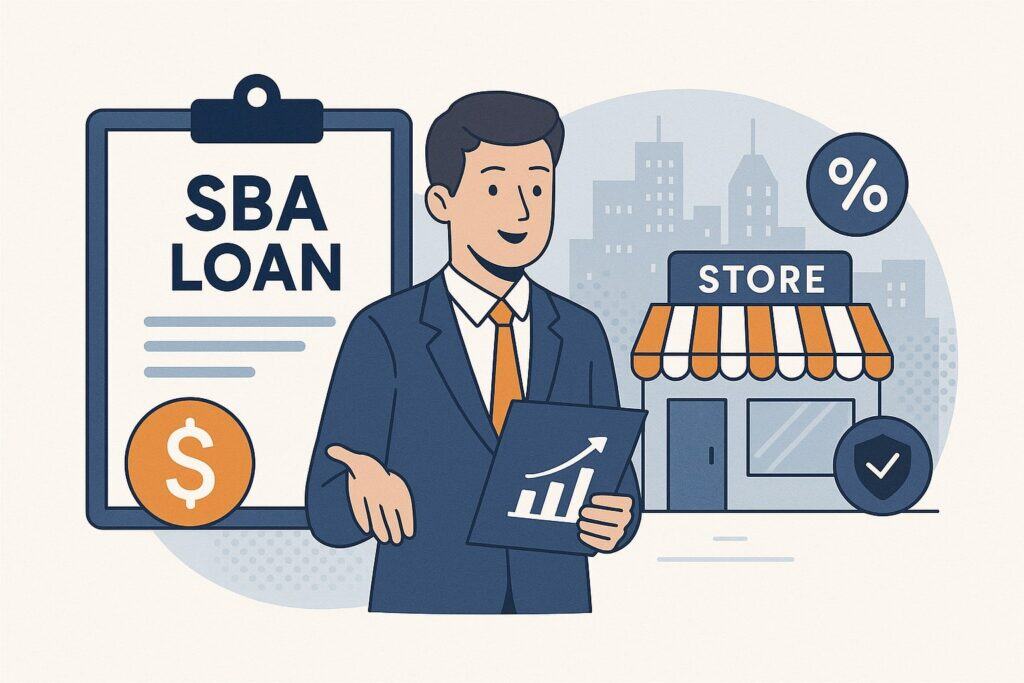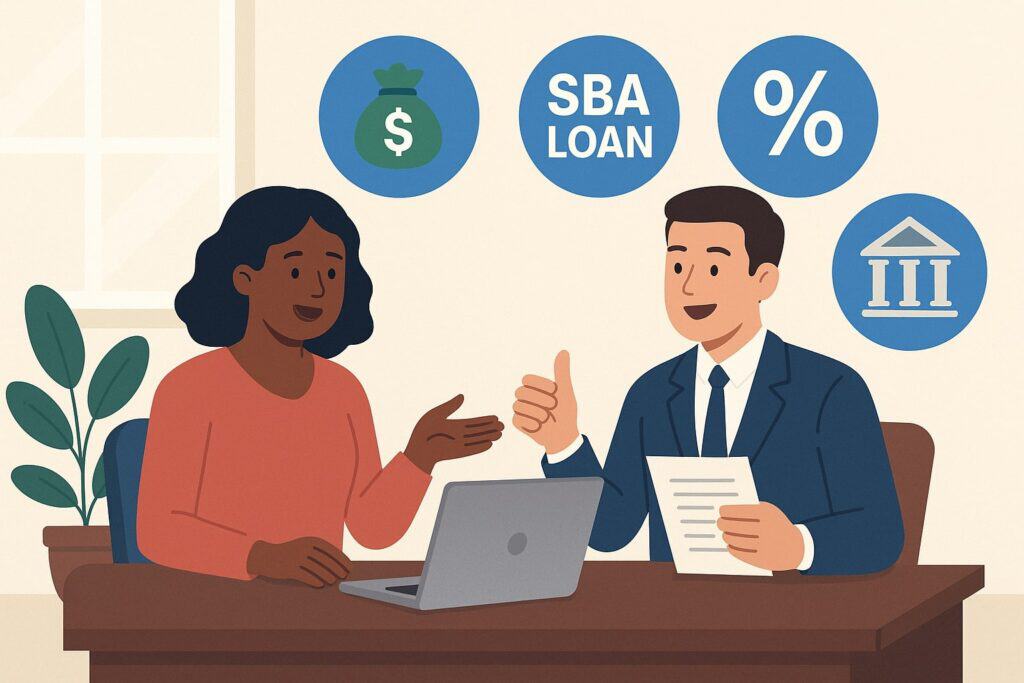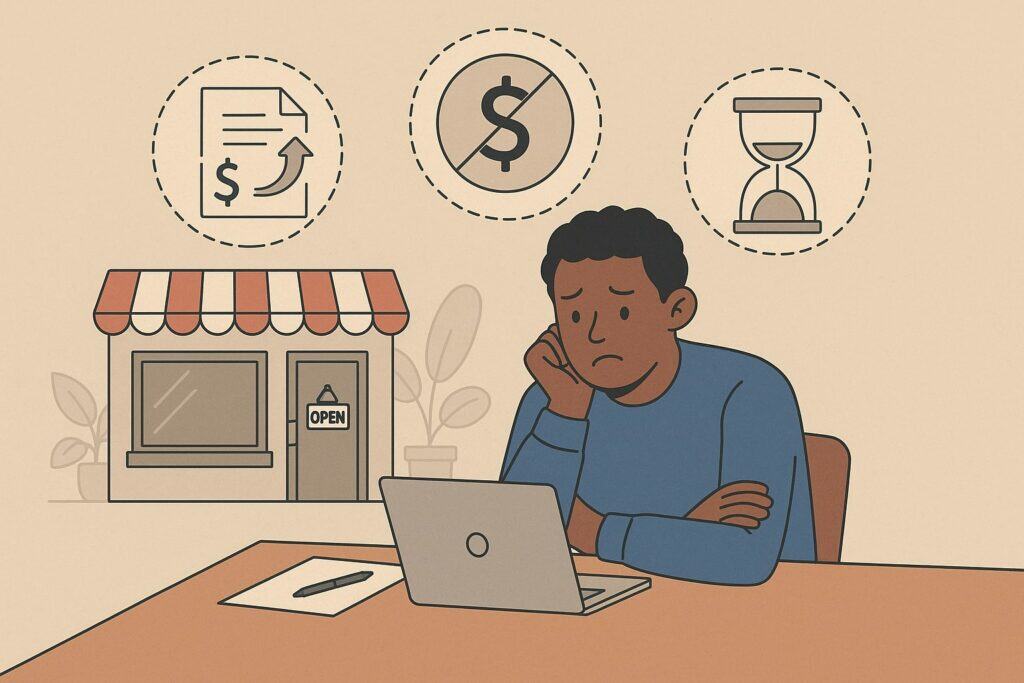
The Pros and Cons of SBA Loans for Small Businesses
Securing financing is one of the biggest challenges that small business owners face. Whether it’s launching a new business, expanding into a new market, or covering operational expenses, access to affordable capital is often the deciding factor between success and stagnation.
Among the many financing options available, Small Business Administration (SBA) loans stand out as one of the most popular and accessible solutions for entrepreneurs in the United States.
These loans are not directly issued by the SBA; rather, they are provided by partner banks, credit unions, and lenders, with the SBA guaranteeing a portion of the loan to reduce the lender’s risk.
While SBA loans have helped countless small businesses thrive, they are not a one-size-fits-all solution. They come with a wide range of benefits and drawbacks that every business owner should understand before applying.
In this comprehensive guide, we’ll dive into the pros and cons of SBA loans for small businesses, explore how they work, what makes them unique, and whether they are the right choice for your specific needs.
Understanding SBA Loans and How They Work

Before analyzing the pros and cons, it’s essential to understand how SBA loans function. An SBA loan is not a direct loan from the government. Instead, it is issued by a participating lender, such as a bank or credit union, but guaranteed by the SBA for up to a certain percentage—usually ranging from 50% to 85% depending on the program.
This guarantee reduces the lender’s risk, which in turn makes it easier for small businesses with limited credit history or collateral to access capital.
There are several types of SBA loan programs, the most common being:
- SBA 7(a) Loans: The most flexible and widely used program, suitable for working capital, equipment purchases, business acquisitions, and debt refinancing. Loan amounts can go up to $5 million.
- SBA 504 Loans: Designed primarily for purchasing major fixed assets such as real estate or heavy equipment. These loans often involve Certified Development Companies (CDCs) along with lenders.
- SBA Microloans: Smaller loans of up to $50,000 for startups, sole proprietors, or small businesses that need limited funding.
- SBA Disaster Loans: Loans provided to businesses affected by declared disasters, including natural events or even pandemics.
The application process for SBA loans is more complex than traditional bank loans, requiring detailed documentation of business financials, tax returns, business plans, and personal guarantees.
Approval often takes longer than other loan options, but the trade-off is that SBA loans generally come with lower interest rates, longer repayment terms, and greater accessibility for small businesses.
The Pros of SBA Loans for Small Businesses

SBA loans have helped millions of small business owners across the country because they offer unique benefits that are difficult to match with traditional financing. These advantages include favorable repayment terms, lower interest rates, accessibility for those with limited collateral, and the credibility that comes with SBA backing.
Favorable Interest Rates and Repayment Terms
One of the most significant advantages of SBA loans is the affordability of borrowing compared to other financing methods. Traditional small business loans or alternative lending options often carry high interest rates, especially for borrowers with limited credit or collateral. SBA loans, on the other hand, are designed to keep interest rates competitive and within government-set limits.
For example, SBA 7(a) loans typically have interest rates that are tied to the prime rate plus a small markup, resulting in much more affordable payments compared to online lenders that may charge double-digit interest rates.
These lower rates translate into significant savings over the life of the loan, allowing businesses to reinvest their profits into growth instead of debt repayment.
In addition to lower interest rates, SBA loans also offer extended repayment terms. Depending on the type of loan, repayment periods can be as long as 10 years for working capital and up to 25 years for real estate purchases.
Longer repayment terms mean smaller monthly payments, making it easier for small businesses to manage cash flow. This flexibility is often a lifeline for businesses that need time to generate revenue and build financial stability.
The combination of lower interest and extended repayment schedules makes SBA loans one of the most attractive financing options available to small businesses. Unlike credit cards or merchant cash advances, which can drain a business’s cash reserves quickly, SBA loans provide a sustainable path for long-term growth.
Accessibility for Small Businesses and Startups
Another major benefit of SBA loans is their accessibility to businesses that may not qualify for traditional financing. Many small businesses struggle to secure loans from banks due to limited collateral, lower revenue history, or less-than-perfect credit scores. Because the SBA guarantees a significant portion of the loan, lenders are more willing to approve applications that might otherwise be considered too risky.
Startups and newer businesses, in particular, find SBA loans valuable. Traditional lenders usually prefer established businesses with several years of financial statements, but SBA loans give newer companies a chance by evaluating factors beyond just years in operation.
While applicants still need to demonstrate their ability to repay, SBA loans are structured to support small enterprises rather than exclude them.
Moreover, SBA loans often allow for lower down payments than conventional loans. This feature is especially beneficial for small business owners who may not have large cash reserves to commit upfront. For example, SBA 504 loans often require only 10% down, compared to 20% or more for standard commercial real estate loans.
This accessibility empowers entrepreneurs across industries—including those in underserved markets or niche industries—to secure funding, hire employees, and grow their operations with confidence.
Wide Range of Eligible Uses
Unlike some financing products that come with restrictions, SBA loans offer flexibility in how funds can be used. Depending on the loan program, proceeds can be applied toward:
- Working capital to cover day-to-day expenses
- Purchasing equipment or inventory
- Acquiring commercial real estate
- Refinancing existing business debt
- Funding expansions or acquisitions
- Covering payroll and hiring new staff
This broad eligibility makes SBA loans a versatile tool for small business owners. Whether a business is looking to stabilize its operations, expand into new markets, or purchase expensive equipment, there is likely an SBA loan program that can support the initiative.
The ability to use loan funds in multiple ways gives business owners freedom and control over their strategy. Rather than juggling multiple financing products, an SBA loan often provides a single, comprehensive funding solution.
Credibility and Relationship Building with Lenders
Receiving an SBA loan can also boost a business’s credibility in the eyes of lenders, investors, and vendors. Because the SBA sets strict qualification and documentation requirements, approval signals that a business has been thoroughly vetted. This credibility can strengthen trust with suppliers, potential partners, and even future lenders.
Additionally, obtaining an SBA loan often leads to building long-term relationships with banks or credit unions. Establishing a strong track record of repayment and financial responsibility through an SBA loan can make it easier for businesses to secure additional financing in the future, whether through traditional loans, lines of credit, or other funding programs.
For many small businesses, this relationship-building aspect is invaluable. Having a trusted financial partner not only provides access to future funding but also opens the door to financial advice, business resources, and strategic networking opportunities.
The Cons of SBA Loans for Small Businesses

While SBA loans offer tremendous advantages, they are not without drawbacks. In fact, many small business owners find that the hurdles associated with SBA loans can outweigh the benefits, depending on their situation.
Some of the most significant disadvantages include a lengthy application process, strict eligibility requirements, collateral demands, and slow funding times.
Lengthy and Complex Application Process
One of the most commonly cited downsides of SBA loans is the complexity and length of the application process. Unlike online lenders or credit cards, which can approve financing in a matter of days—or even hours—SBA loans often take weeks or months to secure.
The application typically requires extensive documentation, including:
- Personal and business tax returns (often 3 years or more)
- Detailed business financial statements
- A comprehensive business plan
- Bank account statements
- Proof of collateral (if required)
- Personal background checks and credit reports
This level of scrutiny can be overwhelming, especially for small business owners who lack the resources or time to compile and organize paperwork. Many applicants require help from accountants or consultants, adding extra costs to the process.
Furthermore, the review process is not only slow but also uncertain. Even after submitting all the required documentation, approval is not guaranteed. Some businesses spend weeks preparing applications only to face rejection or requests for additional information, delaying funding even further.
Strict Eligibility and Collateral Requirements
Although SBA loans are designed to be more accessible than traditional financing, they still come with strict eligibility requirements. Applicants must meet SBA size standards, demonstrate the ability to repay, and often provide personal guarantees.
Collateral is another hurdle. While some SBA loans do not require collateral for smaller amounts, larger loans often demand significant business or personal assets as security.
This can be risky for small business owners who may have to pledge personal property, such as homes or vehicles, to secure the loan. In the event of default, these assets are at risk of being seized.
Additionally, SBA loans typically require that borrowers demonstrate they cannot obtain financing on reasonable terms elsewhere before approval is granted.
This “credit elsewhere” requirement can disqualify some businesses that appear too financially stable for SBA assistance, even if they struggle to secure favorable loan terms from traditional banks.
Slow Funding Timeline
Another major drawback of SBA loans is the slow disbursement of funds. Even after approval, it can take additional weeks for the money to be released. For businesses facing urgent financial needs—such as covering unexpected expenses or seizing time-sensitive opportunities—this delay can make SBA loans impractical.
In contrast, alternative lenders often provide funding within days. While these options may come with higher interest rates, the speed of access is sometimes more valuable than cost savings, particularly in emergencies.
For this reason, SBA loans are often better suited for long-term strategic investments rather than immediate cash flow issues.
Fees and Costs Beyond Interest Rates
While SBA loans are known for their favorable interest rates, they are not without additional costs and fees. Borrowers may encounter guarantee fees, servicing fees, and packaging fees charged by lenders or third-party consultants. These fees can add up, particularly for larger loan amounts, and should be carefully factored into the overall cost of borrowing.
For example, SBA guarantee fees can range from 0.25% to 3.75% of the guaranteed portion of the loan, depending on the loan size and maturity. Although these fees may be financed as part of the loan, they still increase the total amount repaid over time.
Is an SBA Loan Right for Your Business?
Deciding whether an SBA loan is the right financing option requires careful evaluation of your business’s needs, financial health, and long-term goals. If you prioritize affordability, extended repayment terms, and credibility with lenders, SBA loans can be an excellent choice.
However, if your business requires immediate funding, struggles with extensive documentation, or cannot meet collateral demands, alternative financing may be a better fit.
Business owners should ask themselves questions such as:
- Do I have the time and resources to complete a complex application?
- Is my need for funding urgent, or can I wait several weeks?
- Am I prepared to pledge collateral or provide personal guarantees?
- Will the lower interest rate and extended repayment terms outweigh the upfront costs and delays?
By weighing these questions against the pros and cons, you can make an informed decision that aligns with your unique circumstances.
Frequently Asked Questions About SBA Loans
Q1. How difficult is it to qualify for an SBA loan?
Answer: Qualifying for an SBA loan can be challenging, but it is often easier than securing a traditional bank loan. The SBA guarantee reduces lender risk, which increases approval chances.
However, applicants still need to demonstrate strong repayment ability, provide thorough documentation, and often meet specific credit score and collateral requirements.
For many entrepreneurs, the difficulty lies not in eligibility itself but in the extensive paperwork and scrutiny involved. Lenders want to see detailed financial records, a clear business plan, and sometimes even industry experience to ensure that the borrower is capable of running a sustainable operation.
Startups may face additional hurdles since they lack a long financial history, but SBA microloans or smaller 7(a) loans can be more accessible.
Ultimately, while qualifying isn’t impossible, business owners should be prepared to invest significant time in preparation. Hiring an accountant, consultant, or SBA loan specialist may be worthwhile to streamline the process and increase approval odds.
Q2. How long does it take to get approved for an SBA loan?
Answer: The approval timeline for SBA loans varies, but it typically ranges from several weeks to several months. On average, many borrowers report a process of 30 to 90 days from application to funding.
Factors such as loan type, loan amount, lender efficiency, and the completeness of your documentation all influence how long it takes.
The SBA has made efforts to speed up processing through programs like SBA Express Loans, which can provide quicker decisions for smaller loan amounts. However, even with streamlined options, borrowers should not expect overnight approval.
For businesses facing urgent financial needs, this timeline can be a significant drawback. Alternative financing options, such as online lenders, may provide funding in as little as 24 to 72 hours, albeit at higher costs.
Therefore, SBA loans are best suited for long-term planning and major investments rather than emergency cash flow needs.
Q3. Do SBA loans require personal guarantees?
Answer: Yes, in most cases SBA loans require personal guarantees from business owners who hold a 20% or greater stake in the company. A personal guarantee means that if the business defaults on the loan, the owner(s) are personally responsible for repayment, even if it requires liquidating personal assets.
This requirement provides lenders with additional security, especially when collateral is limited. While it may feel risky, it also demonstrates the owner’s commitment to the business’s success. For many lenders, a personal guarantee is non-negotiable when it comes to approving an SBA loan.
Business owners should carefully weigh this responsibility. Signing a personal guarantee means that your home, car, or savings could be at risk in the event of business failure. While SBA loans offer excellent terms, this level of personal liability should be considered seriously before moving forward.
Q4. Are SBA loans better than traditional bank loans?
Answer: SBA loans and traditional bank loans both have their place, and the better option depends on the borrower’s situation. SBA loans typically offer lower down payments, longer repayment terms, and more flexible eligibility, making them particularly appealing to small businesses that may not otherwise qualify for financing.
Traditional bank loans, however, can sometimes be faster to secure and may involve less paperwork if the borrower already has a strong relationship with the bank.
For businesses with excellent credit, high revenue, and significant collateral, a conventional loan may offer equally competitive rates without the SBA’s strict documentation requirements.
In short, SBA loans are better for small businesses seeking accessibility and affordability, while traditional bank loans may be more suitable for established businesses with strong financials and urgent funding needs.
Conclusion
SBA loans remain one of the most powerful financing tools available to small businesses in the United States. Their low interest rates, long repayment terms, accessibility, and credibility make them a preferred choice for entrepreneurs seeking sustainable growth.
However, they are not without drawbacks. The lengthy application process, strict eligibility standards, collateral requirements, and slow funding timelines can present serious challenges, particularly for businesses with urgent financial needs.
The decision ultimately comes down to your business’s priorities. If you value affordability and long-term growth over speed and convenience, an SBA loan could be the best option. On the other hand, if you need fast access to cash or cannot meet the documentation requirements, alternative financing may better suit your needs.
By carefully weighing the pros and cons of SBA loans, business owners can make informed financial choices that support their vision, growth, and long-term success.